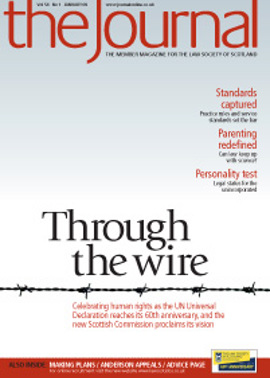Don't get caught short by transfer traps

The final deadline in the transition phase has just passed. Even the slowest among us can spot the obvious flaws in a layout plan from 20 paces; our operating plans slip easily off the assembly line; some of us have even spotted that mythical beast, the premises licence.
Thoughts now turn to what we have to do when premises change hands, leading us into hitherto unexplored parts of the Act. There should be nothing inherently difficult in the transfer of a licence, but caution is required. In the transition phase the 1976 Act licence will still have to be transferred as usual, but what is to be done about the 2005 Act licence? Many have been granted, but only a few have been issued. Some boards give a written indication of the conditions which have been applied, but many more do not. How can you be sure precisely what will be issued and when? If your client is happy to take a view, after due enquiry, can you be sure that the lender will be equally pragmatic? Is it wise to let your client complete a purchase in these circumstances?
When to apply
If the application has been lodged, but not processed, the purchaser can pay a fee of £34 and have the application transferred to his name. The risks here are obvious, especially if the premises are in one of those areas whose boards allow building standards officers to apply 2008 regulations to publicans who thought that the phrase “grandfather rights” meant something. I would suggest that those pubs whose 2005 Act licences have been granted for a year until someone decides what to do about additional ladies’ toilets are all but unsellable unless full renovation is proposed. If the application has not yet come under the scrutiny of the relevant officials, is it wise to let your client take the risk?
Whose application?
It is clear that the transfer sections of the Act were not drafted by anyone with practical experience of the purchase and sale of licensed premises. Section 33 implies that the transfer of the licence will be applied for by the seller, something which will never happen in practice. Section 34 does permit the transfer application to be made by the proposed licensee, but only in certain circumstances. The obvious examples are death and incapacity. Reference is made to an individual, partnership or company becoming insolvent, or the holder, being a person other than an individual, partnership or company, being dissolved. What happens if a solvent partnership is dissolved or a company goes into members’ voluntary liquidation? The person acquiring the premises may also make the application if the business carried on in the licensed premises is transferred or sold. This ignores the common situation where a tenant has disappeared, leaving premises closed for some time. It cannot be said that the business is being transferred – there is no business left. Who may make the application in those circumstances?
Variation complications
The incoming proprietor may wish to vary the premises licence. Section 35 tries to accommodate this. If the transferee so stipulates, the transfer application may be made conditional on the prior grant of a variation. This is done at a board hearing, taking conveyancers back to the bad old days prior to the temporary transfer. Once this transfer has taken place, the seller can no longer trade legally. What happens if completion of the sale is delayed or, worse still, does not happen at all? The varied licence may be of no use to the seller of the business and it could take months to have the process reversed. It is unfortunate that some sort of provisional variation procedure was not provided.
These are unfortunate drafting oversights. One hopes that clerks will take a commonsense approach, but this important part of the legislation should have been given more care.
In this issue
- Public law in Scotland
- Harmony in conflict management
- Tapping Reeve and his legacy
- Busy times at 60
- Living wills - why?
- Forward by the rights
- A cornerstone of rights
- Welcome for rejections takeup
- Sins of omission
- A time to buy?
- Parenthood reborn
- Persons unknown
- Front of the class
- Setting the standards
- Client service: the standards
- Judicial appointments: how you can take part
- ABS - the next phase
- Third parties and premature complaints
- Planning to perform
- Manual for the mind
- Computing on tap - or money down the drain?
- When resolution is not enough
- Ask Ash
- Making up lost time?
- Don't get caught short by transfer traps
- Collaboration: a new dimension
- Packed and ready
- Regulator on a roll
- Scottish Solicitors' Discipline Tribunal
- Website review
- Book reviews
- Medicines: the wrong cure
- Fraud alert! (and a cautionary tale)






